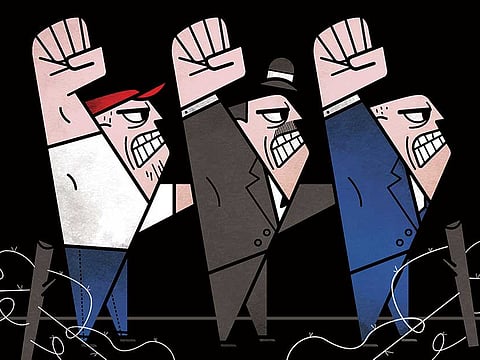The state of the world and the region in 2016
It will go down in history as the year that saw the rise in hate crimes and politics of anger and fear

History will remember 2016 as the year some 61 million Americans elected a visibly racist and populist angry white American — Donald Trump — as the 45th president of the United States. He won a landslide election on the popular promise ‘to build a great, great wall on our southern border and deport 11 million undocumented immigrants in the US.”
History will also remember 2016 as the year Britain voted to leave EU, with a surprising 52 per cent of voters backing Brexit on a national turnout of 72 per cent, the highest ever for a UK-wide referendum and the highest for any national vote since the 1992 general election.
The Brexit vote was clearly a rejection of decades-old politics of liberalism, hope and openness. The Brexiteers’ main promise was to end the free flow of immigrants from the European Union into Britain.
History additionally will remember 2016 as the year Europe saw its biggest tilt to far-right populist parties since the end of the Second World War.
European socialist parties are out, liberal parties are in disarray and disillusioned, middle-right groups are struggling whereas far right, and even the alt-right parties (apparently the new name for white supremacy) flourish.
Populist parties with fascist tendencies dominate parliaments in nine European countries and are mushrooming all over the continent.
The year will go down in history as one that saw a rise in hate crimes and politics of anger and fear.
Decades-old politics of openness and multiculturalism and the embrace of immigrants and refugees are in short supply in the West where it matters most.
The year is one that marks the end of tolerance by the very people who supposedly once preached religious tolerance and cultural diversity.
In 2016 Europe, the United States and the West in general do not carry the same moral authority to speak for tolerance and openness as they did a year ago.
Suddenly Europe is unduly xenophobic, America is alarmingly Islamophobic and the West by and large is politically polarised, socially divided, ideologically out of character and people are poles a part.
Trumpism, nativism and populism are on the march, dominating the political sphere, challenging the liberal world order, which was mainly designed by the US after the Second World War. The politics of 2016 has ignited a grand shift towards a particularly illiberal world.
Moderates gone with the wind
But if 2016 was a depressing year for the politics of hope and acceptance of others in the West, the year was the worst for forces of stability and moderation in the Middle East. History will remember 2016 as the year when sectarianism, extremism and violence reached new heights in the perpetually tormented Middle East. This was the year when what was left of Arab and Muslim moderates found itself gone with the wind.
The Middle East of 2016 is full of extremists of the worst kind. Forces of extremism, unleashed in the bloodiest and strongest way possible, are armed to the teeth and are playing havoc all over the place.
According to the 2016 Arab Human Development Report, the Arab World which constitute 5 per cent of the world’s population is home to 45 per cent of acts of terrorism and more than 60 per cent of the world’s displaced and refugees.
Two weeks ago the New York Times came to this startling conclusion: Everything has gone wrong in the Middle East. It ran a much longer than the typical New York Times Magazine feature story; in print, it occupied an entire issue.
In the Middle East, 2016 will be remembered as the year when the centuries-old sectarian polarisation became militarised and politicised like never before. Iran’s aggressive policies are fully responsible for the escalation of regional sectarianism and its current politicisation and militarisation.
The sectarian genie is clearly out and it is hard to put it back on a leash. It might be around for years to come, but history will remember 2016 as the year the sectarian bottle was completely shattered, rendering it impossible for anyone to fix. It is difficult to fix Iraq anytime soon. It is impossible to stop the further implosion of Syria. It is inconceivable that the ongoing political rivalry between Iran and Saudi Arabia will subside by the end of this decade. Indeed the sharp regional political polarisation might be the main feature of the first half of the 21st century.
The politicisation and militarisation of sectarianism is literally confined to the Middle East but the rise of populism and racism in the West could trigger global bigotry. The politics of bigotry and a fear of foreigners taking over has proven to be contagious and could be the next global virus emanating from a White House occupied by an angry white American for the next for years.
At stake is the gradual dismantling of democratic norms, civil liberties — paving the way for a 21st century autocracy.
The state of the world and the region in 2016 was both depressing and deeply troubling. Millions of concerned people around the globe are already thinking of the post-2016 period, but lack the assurance that 2017 is going to be any better.
Dr Abdulkhaleq Abdulla is professor of Political Science, chairman of the Arab Council for Social Sciences, theacss.org and a visiting senior fellow at the London School of Economics. You can follow him on Twitter at twitter.com/Abdulkhaleq_UAE.
Sign up for the Daily Briefing
Get the latest news and updates straight to your inbox



